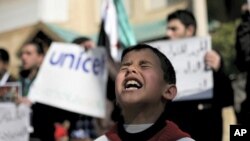The International Committee of the Red Cross says it is trying to broker a humanitarian cease-fire in Syria, as government tanks and troops mass around the opposition stronghold of Homs after bombarding the city for more than two weeks.
| SYRIAN ARMED FORCES * 220,000 ground forces. * 70,000 Air Force personnel. * 5,000 Navy personnel. * 314,000 reservists. * 4,950 main battle tanks. * 590 reconnaissance vehicles. * 2,450 armored infantry fighting vehicles. * 1,500 armored personnel carriers. * 3,440 artillery pieces. * 500 mortars. * 4,100 surface-to-air missiles. * At least 550 surface-to-surface missiles. * 300 fighter-ground attack planes. * 48 intelligence/surveillance planes. * 22 heavy transport planes. * 36 attack helicopters. * 100 reconnaissance/transport helicopters. * 20 transport helicopters. PARAMILITARY FORCES * 108,000 personnel, including 8,000 Interior Ministry gendarmerie, 100,000 militia. FREE SYRIAN ARMY * Opposition claims to have as many as 40,000 personnel but analysts say 4,000 to 7,000. * Arms capability and stockpile unknown. |
ICRC chief spokeswoman Carla Haddad said Monday the Geneva-based agency has been in talks with Syrian authorities and rebels about ways of stopping hostilities to allow the delivery of urgently needed humanitarian aid to affected areas. The ICRC is the only international agency with aid workers in Syria and has been cooperating with the Syrian Arab Red Crescent.
Syrian rights activists said President Bashar al-Assad's government deployed tanks and other reinforcements around Homs on Monday ahead of a possible ground assault. They said the latest government shelling killed at least nine people in the central city, a major hub of an 11-month uprising against Mr. Assad's autocratic rule. Syrian state news agency SANA said 12 security personnel were buried after being killed in fighting with rebels.
None of the casualty figures could be independently verified because Syria restricts the operations of foreign media.
U.S. Secretary of State Hillary Clinton said Monday nations opposed to Assad's deadly crackdown on the uprising will demonstrate his increasing isolation at a Friends of Syria meeting in Tunisia later this week. Speaking on a visit to Mexico, she said the meeting will focus on what she called the "brave" Syrian people's need for "support and solidarity."
Assad also received several messages of support on Monday from his allies Iran, Russia and China. Iranian state media said two Iranian warships docked at the Syrian port of Tartous on a mission to train Syrian naval forces.
Separately, SANA said a delegation of Russian lawmakers met the Syrian President in Damascus, welcoming his promised political reforms, including a referendum on a new constitution scheduled for Sunday. Syrian opposition groups and Western nations have dismissed the reforms as meaningless while Mr. Assad continues suppressing dissent.
In another move, China's state-run People's Daily newspaper published a commentary warning Western nations that their continued support of Assad's opponents will lead to a "large-scale civil war" in Syria.
U.S. Senator John McCain said Monday Washington should provide medical and technical assistance to the Syrian rebels to give them the "wherewithal to fight back and stop the slaughter." He was speaking on a visit to Cairo.
"I am not saying that the United States needs to directly supply arms to the Syrian National Army," said McCain. "I am saying that there are ways to get assistance, ranging from medical assistance to technical assistance such as GPS and other things that we could provide to the Syrian National Army, in support of the Syrian National Council and there are ways to get weapons into Syria. It is time we gave them the wherewithal to fight back and stop the slaughter.''
Syrian state media said Assad told the Russian lawmakers that Syria is a victim of "armed terrorists" supported by foreigners aiming to destabilize the country, a claim he has repeated frequently. The uprising began with peaceful protests last March, but has become increasingly militarized in recent months with battles between army defectors and pro-Assad troops. Human rights activists the unrest has killed at least 6,000 people.
Earlier this month, Russia and China vetoed a Western- and Arab-backed effort to pass a U.N. Security Council resolution endorsing an Arab League plan for Mr. Assad to cede power. But, Arab League Secretary-General Nabil Elaraby said Monday he believes Moscow and Beijing may be shifting their positions on the Syrian crisis.
"The [meeting in Tunisia] will include a large number of countries and the goal of this meeting is to put extra pressure on Syria," said Elaraby. "Also, there are indicators coming from China, in particular, and to a certain extent from Russia that there maybe a change in (their) position.''
|
Join the conversation on our social journalism site -Middle East Voices. Follow our Middle East reports on Twitter and discuss them on our Facebook page. |




